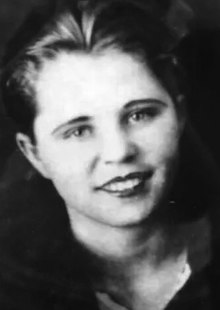Lyubov Grigoryevna Shevtsova
Lyubov Grigoryevna Shevtsova ( Russian Любо́вь Григо́рьевна Шевцо́ва ); (* September 8, 1924 in Iswaryne Krasnodon ; † February 9, 1943 in Krasnodon) was a Russian partisan who fought as a resistance fighter against the German armed forces and National Socialism .
Life
Lyubka (Lyubow Grigorjewna) Schewzowa became a member of the youth group Molodaja Gwardija (Young Guard) from Krasnodon (Pervomajsk Luhansk) in 1942 after finishing school . It carried out acts of sabotage against the German Wehrmacht, worked on the radio with the Russian information service and printed and distributed communications from the Russian command throughout the area. Lyubka Schewzowa was betrayed along with all members of the Young Guard, arrested by the Germans on January 8, 1943, mistreated and repeatedly tortured. While 56 members of the group were thrown alive into the mine wells of Penvomaika, they were left alive because the German Wehrmacht wanted to blackmail them into disclosing the radio code. On February 7, 1943, a week before the liberation of Krasnodon by the Red Army, Lyubka Shevtsova was shot and killed by an SS Rottenführer at the age of eighteen.
Lyubka Schewzova's farewell letter is published in the anthology Lettere di condannati a morte della Resistenza Europea | Last letters from the European resistance condemned to death .
reception
The Italian composer Luigi Nono selected ten farewell letters from women, men and young people who were murdered by the German Wehrmacht and the National Socialists for the text of his choral work Il canto sospeso, written in 1956 , including the letter from Ljubka Schewzowa.
The short letter from Ljubka Schewzowa to her mother is of central importance for the choral work Il canto sospeso (Part 7) by Luigi Nono. The additional reading of Lyubka Shevtsova's farewell letter is also part of the concert performance in Il canto sospeso (speaker: Susanne Lothar ) with Claudio Abbado and the Berlin Philharmonic in the Berlin Philharmonic in December 1992. Lyubka Schewzowa wrote the short farewell letter a few hours before the shooting :
"Goodbye, mother, your daughter Liubka is going away into the damp earth."
Translations of the letter in several languages can be found on the interactive Italian portal Canzoni contro la guerra .
Web links
literature
- Piero Malvezzi, Giovanni Pirelli (ed.): Lettere di condannati a morte della resistenza europea - Letters from those sentenced to death from the European resistance , with a foreword by Thomas Mann, Giulio Einaudi publishing house, Turin 1954 (first edition)
- Lettere di condannati a morte della resistenza europea - Russian edition
- Jean Lartéguy: Les jeunes du monde devant la guerre: documents . Gallimard, Paris 1955, ISBN 978-2-07-023750-0 , pp. 195, 200
- Audio CD Luigi Nono 'Il canto sospeso', Berliner Philharmoniker, conductor: Claudio Abbado , speakers: Susanne Lothar and Bruno Ganz - Sony Classical 1993 (documentation booklet)
- DVD Luigi Nono Il canto sospeso special edition EU 2013 for German schools abroad - Patronage: Guido Westerwelle , Federal Minister of Foreign Affairs © Fondazione L'Unione Europea Berlin ISBN 978-3-943933-00-0
Individual evidence
- ↑ a b c Lettere di condannati a morte della Resistenza Europea | Last letters from the European resistance condemned to death. Edited by Piero Malvezzi and Giovanni Pirelli, foreword by Thomas Mann. Steinberg-Verlag, Zurich 1955, p. 550.
- ^ The basis of the text of the composition Nonos are also the farewell letters published in the anthology by Anton Popov (Bulgaria), Andreas Likourinos (Greece), Eleftherios Kiossès (Greece), Konstantinos Sirbas (Greece), Chaim (Galicia) (Poland), Irina Malozon (USSR), Esther Srul (Poland), Eusebio Giambone (Italy) and Elli Voigt (Germany).
- ↑ The recording of the concert is the basis of the so-called Nonoprojekt , an initiative by Claudio Abbado and a group of friends IncontriEuropei for schools in Europe, whose sponsorship was later taken over in 2001 by the Fondazione L'Unione Europea Berlin . Website for the nonoproject .
- ↑ Lyubka Schewzowa, Luigi Nono. Il Canto Sospeso
- ^ Canzoni contro la guerra - Lettere Il canto sospeso
| personal data | |
|---|---|
| SURNAME | Shevtsova, Lyubov Grigoryevna |
| ALTERNATIVE NAMES | Шевцова, Любовь Григорьевна (Russian) |
| BRIEF DESCRIPTION | Russian resistance fighter against National Socialism |
| DATE OF BIRTH | September 8, 1924 |
| PLACE OF BIRTH | Iswaryne Krasnodon |
| DATE OF DEATH | February 9, 1943 |
| Place of death | Krasnodon |
